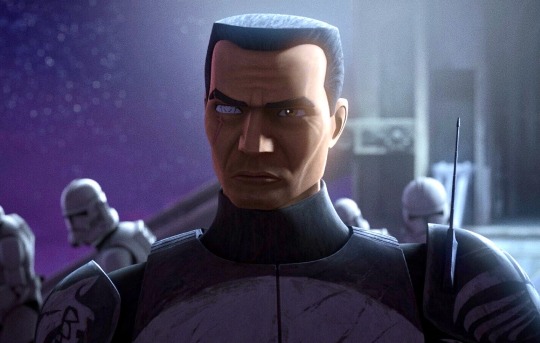Text

Thank you so much to everyone that submitted recommendations this week! A comprehensive list of this week’s submissions can be found under the cut! Recommendations are organized by show/media, and any main pairings will be listed after the title.
☁️ = 18+ content
🌸 = contains spoilers of a currently running show
Fics:
The Clone Wars:
☁️ One Step at a Time by @wild-karrde
The Bad Batch:
🌸 (TBB S3) The Plant Prowler of Pabu (Crosshair x gn!Reader) by @dystopicjumpsuit
Tech x gn!Reader Cuddle Ficlet by @dystopicjumpsuit
☁️ Little Lies and Brown Eyes (Tech x f!Reader) by @anxiouspineapple99
☁️ Don't Lose Your Focus (Hunter x f!Reader) by @decembermidnight
Orders by @gaeasun
We Were a Family Pulled From the Flood by @jorolle
Accolades by @levi-venn
Batman:
Northern Attitude (I Was Raised on Little Light) by @theskeptileptic
Art:
The Clone Wars:
Cutup Art by @drunksiren
Corrie Guard Mood Board by @ominouspuff
Commander Fox Art by @captain-rex
The Bad Batch:
Omega Gets a Tooka by @zaana
Hunter and Omega Art by @kingeika
Echo with Tookas Art by @omaano
🌸 (TBB S3) Red-Handed by @pinkiemme
Tech x Phee Art by @jedizhi
Tech x Phee Art by @gingerpines
Tech x OC Avery Art by @lightspringrain
☁️ Little Lies and Brown Eyes Art by @mesvi
OC Silvie Art by @vimse
Rebels:
Kalluzeb Art by @sunatsubu
27 notes
·
View notes
Text
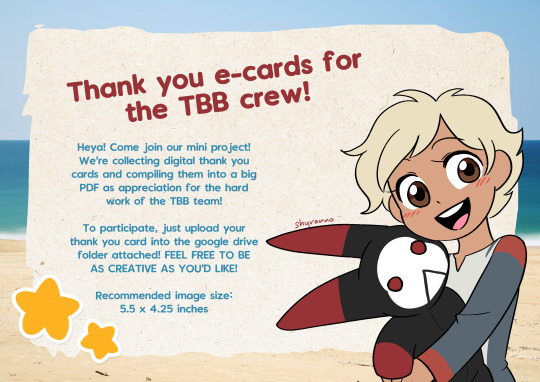
Please feel free to draw, put stickers, use Canva, etc! Be as creative as you'd like, and write as much or as little as you want! Here is the google drive:
https://drive.google.com/drive/folders/16MCDIrenA7BI6EikxmnDjkjDP98xb5Cc?usp=drive_link
Deadline: 30th April 2024
Let's show our appreciation together! :DD
428 notes
·
View notes
Text
It just doesn't feel like Star Wars if it's mindlessly Jedi-critical or anti-Jedi, and not because the Jedi are perfect, but because they're the core of what makes Star Wars what it is. You may not agree with their philosophy and their modus operandi, but you can't deny that their lessons aren't just a particular way of thinking but the fundation of how the Star Wars universe works by. It's interesting to explore other characters and groups and their way of thinking the universe but trying to rewrite the base of how the Force works or the rules of that universe just to contradict the Jedi only serves to make Star Wars feel that tad less Star Wars.
#YES#Star Wars wouldn’t exist without the Jedi#they’re the key to Star Wars#you can’t have Star Wars without the Jedi
84 notes
·
View notes
Text
Broke: Individual Jedi were good people with good intentions, but the Jedi Order as an institution was flawed and needed to be reformed.
Woke: The Jedi Order as an institution is completely correct in all of its teachings about everything and following the Jedi's teachings about selflessness and compassion are what allow people of the galaxy to achieve balance and peace, but these teachings are an ideal to live up to and they assert that everyone has the capacity for darkness within them anyway, so sometimes individual Jedi will make mistakes or struggle with fear and pain and selfishness as they strive towards being their best selves the way their culture trains them to do.
665 notes
·
View notes
Text

Happy Mermay & start to Elriel Month!! 🧜🏻♀️
There was no way I wasn’t going to kick this epic time off without the amazing @carasalexandra to bring us a follow up the original mermay piece!
You can find the first one on @atouchofmagicdesigns shop! The second will be up on mine hopefully by Wednesday if the prints/bookmarks arrive 💙
Thank you so so much for taking on this project and putting so much enthusiasm and love into it @carasalexandra 🥹💙 Endlessly grateful!
Characters by @therealsjmaas
Part 1:

1K notes
·
View notes
Text

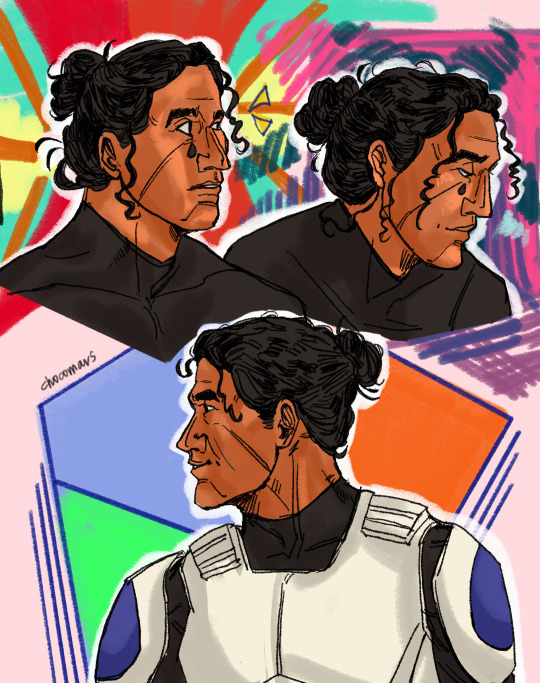
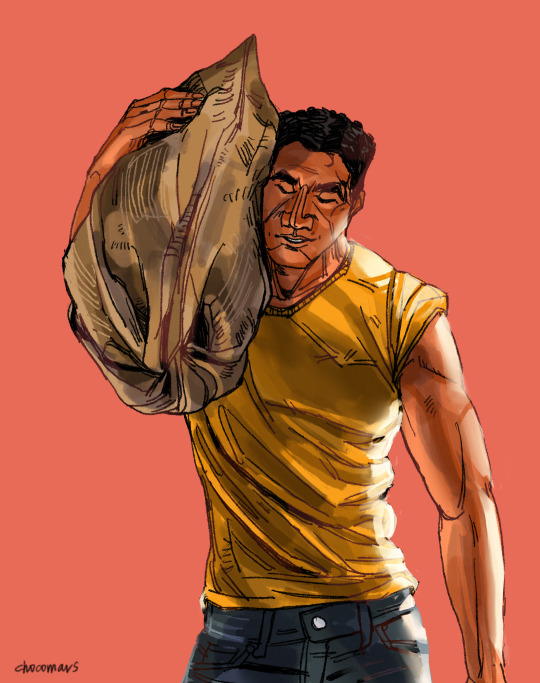
Drew some clones while I desperately try to whack back the art block
289 notes
·
View notes
Text
You know those posts that are like "it's so hard to be a Jedi fan who also loves Luke/Anakin/Ahsoka/etc"? Here's mine.
It's so hard to be a Jedi fan who also loves the clones sometimes. And I do love the clones, I genuinely think the only good thing to have come out of TCW was the way it changed the characterization of the clones for good.
But damn so many clone fans just really hate the Jedi and can't STAND when we Jedi fans dare to just talk about the Jedi instead of the clones in any given situation.
#I like both but the anti Jedi sentiments I’ve seen from clone fans is CRAZY#they act like the Jedi were supposed to be infallible and are evil for *enslaving* the clones when it wasn’t the Order’s decision to make#people forget that the Jedi weren’t given a vote in the Senate either
108 notes
·
View notes
Text
This entire sequence was just SICK.
Hunter pulled a Tech-Turn 2.0 with the ship there, just less gracefully.
#I was shocked by Hunter’s flying skills in this episode#he kicked ass (except for the part when he didn’t sense that big ass bear)#tbb spoilers#tbb hunter
220 notes
·
View notes
Text
How did we go from Hunter sniffing dirt to measure distances in The Clone Wars to him not knowing that a living breathing creature was right in front of them in The Bad Batch season 3
559 notes
·
View notes
Text
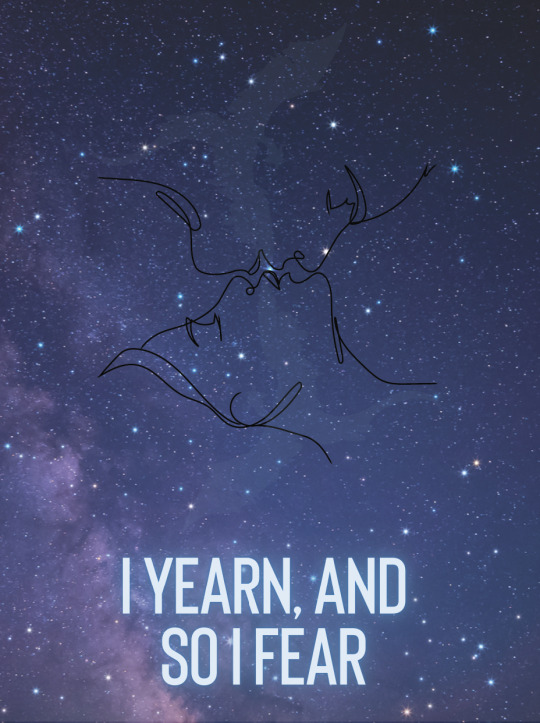
Summary. Nearly a year since the Galactic Empire’s rise to power, Kazi Ennari is trying to survive. But her routine is interrupted—and life upended—when she’s forced to cohabitate with former Imperial soldiers. Clone soldiers.
At its core, this is a story of love—of its risks, its sacrifices, and its prevailing existence in the midst of hurt. This is a story to remember how to love, and to learn how to accept love. This is a story of reconciling sisterhood, the turmoil of yearning, and the raw vulnerability of being known.
This is slow-paced and domestic, minimal action with an emphasis on character dynamics. Inspired by A Thousand Splendid Suns and The Book Thief.
Pairing. Commander Wolffe x female!OC
Content Warnings. Canon-typical violence, familial struggles, terminal disease, bigotry, explicit sexual content, death.
Tags. Fearful-avoidant attachment style. Slow burn. Emotional slow burn. Physical slow burn. Sexual tension. Angst. Mutual pining. Trust issues. Intimacy issues. Hurt/comfort. Hurt/no comfort. Eventual smut. Minimal smut. Domestic fluff. NO instant attraction. NO instant love. Learning to trust. Learning to love. Learning to accept love. Parenting. Sisterhood. Unhealthy coping mechanisms.
Rating. E (explicit)/18+/Minors DNI.
Muse. Throughout this story there are 7 “Muses.” Inspired by Greek mythology, each Muse is a short blurb. Some provide character context for side characters. Others provide thematic context. Due to their brevity, the Muses are only available to read on AO3. (To access my works, you need an AO3 account.)
Release Dates. The dates below are tentative and subject to change. When I reach Part 4, I will list new release dates.

Part 1
Chapter 1
Chapter 2
A Muse
Chapter 3
Chapter 4
Chapter 5
Chapter 6
Chapter 7
Chapter 8
Part 2
Chapter 9
Chapter 10
Chapter 11
A Muse
Chapter 12
Chapter 13
Chapter 14
Chapter 15
A Muse
Chapter 16
Part 3
Chapter 17 - May 9th
Chapter 18 - May 16th
A Muse - May 16th
Chapter 19 - May 23rd
A Muse - May 23rd
Chapter 20 - May 30th
Chapter 21 - June 6th
Chapter 22 - June 27th
Chapter 23 - July 4th
Chapter 24 - July 11th
A Muse - July 11th
Chapter 25 - July 18th
Part 4
Chapter 26 - July 25th
Chapter 27
Chapter 28
Chapter 29
Chapter 30
A Muse
Chapter 31
Epilogue

Behind the Scenes
Chapter 15 artwork of Kazi and Daria by @eyecandyeoz
#reblogging because I added new release dates#if you're curious about the release schedule for Part 3
32 notes
·
View notes
Text
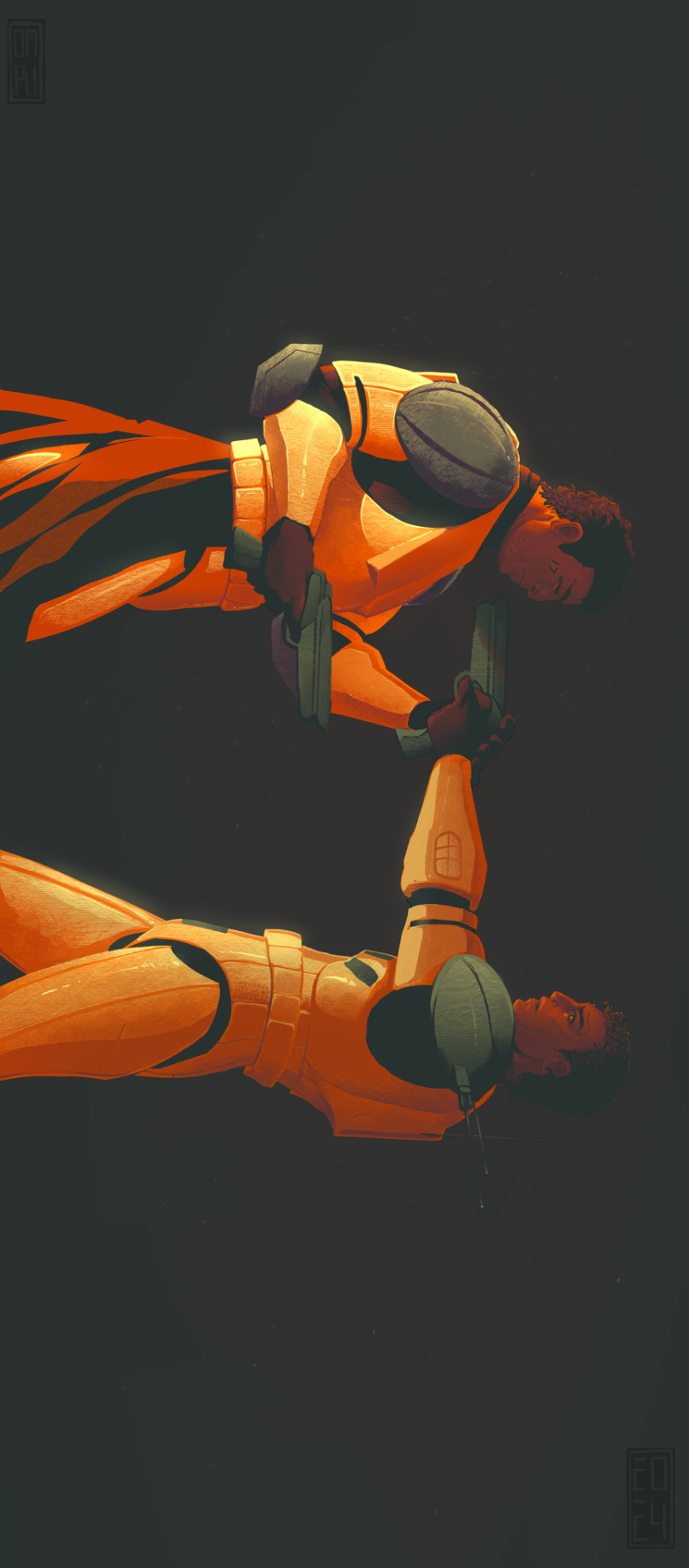
No Man Left Behind / Something Worth Dying For
REQUESTS / BLOG EVENT
Request from @razzbberry - Palette #1 - Alpha-17, Cody - Death of the Cynic in Me
Notes and close-ups beneath the cut!
Notes: I think Seventeen would, both subconsciously and consciously, keep his cynicism as long as possible. It’s how he thinks the world works, but it’s also a survival tool. It’d be a very, very slow death.
It’s put to the test with Cody — not because Cody is special among his fellow clones, but because he’s one of the first that bothers to fight Seventeen on his own terms. The argument is always the same. Cody wants to talk about what he hopes to be, someday, after he is a soldier. Seventeen thinks he’s stupid to think that’s possible, or that he’d be capable. Cody knows it, and he, might not be. Seventeen thinks it’s even more stupid, in that case; what a waste of energy.
It develops. When they’re older, and in the thick of war, one day Cody risks his life for the chance to save a brother that was going to die anyway. Seventeen yells at him for fifteen minutes once he’s conscious about luck and stupidity and the trouble it’s causing Seventeen and the false hope it’s engendering in others. Cody says he can disagree all he likes, but he doesn’t give a fig, respectfully. Seventeen thinks Cody can go try to get blown up again, if he thinks so.
There’s no point fighting for a better tomorrow; they’re bought and paid for to fight for something else, FOR someone else. Seventeen is prepared for being fodder, as a result. He’s prepared for unfairness and the bleak life that they’re living. Instead he watches as Cody defeats odds time and time again, somehow managing to balance being an exceptional military leader with a secondary war to live for something more, running himself ragged and — inexplicably — gaining ground. Each of those little victories are a little death for Seventeen’s cynicism; a chipping away. A little seed of Cody’s brand of hope takes root, awkward and begrudging, fond and tentative.
Then Order 66 happens. Cody’s efforts for a better life are in vain, and Cody himself-
Cody may never know that Seventeen was right abut just how helpless they were. Now he only knows that Seventeen is a traitor, apparently, because Seventeen — for once in his life — was the lucky one and his chip malfunctioned.
And Seventeen could say ‘I told you so’. He could rest, vindicated and resigned, in the fact that every dream Cody built up and everything he thought was worth dying for is pointless, now — as he always suspected it would be.
But it isn’t fair, even by Seventeen’s standards.
“What are you doing,” Rex will rasp, caught in a strange role reversal as Seventeen paints an armor set with Cody’s golden colors. “He’s not coming back, Seventeen. He can’t. It’s pointless to keep going after him, you need to stop.”
“No,” Seventeen will answer, unbothered, “I don’t think I will.”
“We can’t — we can’t keep hoping,” Rex says, because he means he will probably have a breakdown if he imagines there is even a pitiful possibility he could save his brothers and then have to turn away from that scrappy chance for the greater good and Rebellion, and all that. “We’ve got to move on.”
“Go on.” Seventeen will invite sincerely, one brow raised because he knows Rex better than that.
“Do you want him to shoot you?” Rex will finally yell, all knotted up at the thought of losing Seventeen too, even though it’s funny because Seventeen was never kind to Rex.
“He can try,” Seventeen will say, touching up the last of the paint. He will stand, wiping his fingers, and pick up his pack. “See you when we get back, then.”
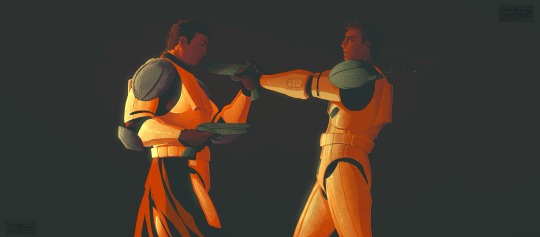

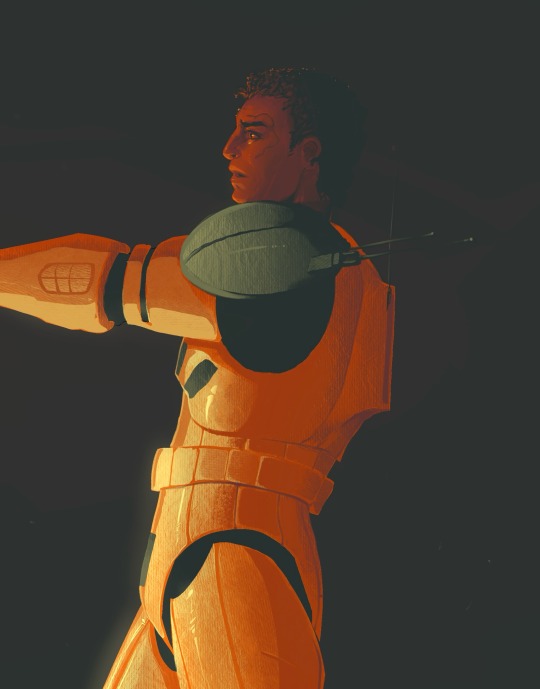
Alt version:
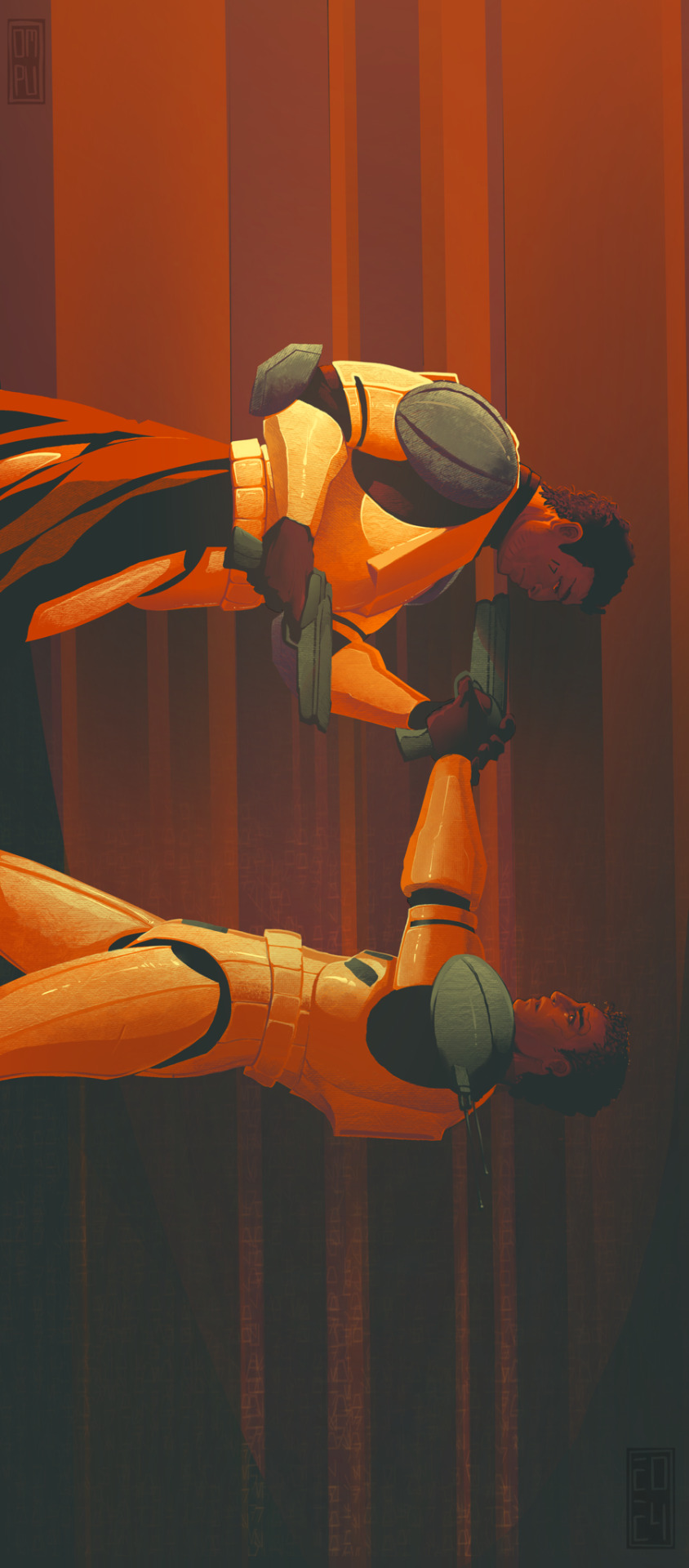
364 notes
·
View notes
Text
Hey, in case you need to hear this today:
For every 1 person that tells you how much they like your work, there's probably close to 10 people who are just quietly enjoying what you create.
Your art has worth.
Your writing has worth.
You'll never know just how many people your work has touched in some way.
396 notes
·
View notes
Note
I LOVE your works. I wasn't totally on board the Woffle train for the longest time and then decided to try your stories and now I'm totally on board this ride. You're truly amazing at writing.
Welcome to the Wolffe train. And you’ve joined at the perfect moment because we finally have Wolffe in canon after being absent for 11 years!
Anyway, thank you so much for giving my story a chance, and for your kind words! I always feel like I don’t do Wolffe justice so this really lifted my mood. Wolffe is my fav, and writing him is so much fun, and so I’m glad you’re aboard his train. He’s literally the best. :)
5 notes
·
View notes
Text
D—no need for apologies!! I’m so glad you’re giving this story a chance :)
I’m even happier knowing that this chapter was a “banger”! I was always afraid that this chapter wasn’t a good enough opening because of the sheer amount of information and newness it adds. From Kazi and Daria’s introductions, to the unknown of the rebel network, to the unfamiliar setting, it can be overwhelming. So im so happy you found the tension present and the introduction an engaging start!
Thank you so much for reading!
I Yearn, and so I Fear - Part I - Chapter I
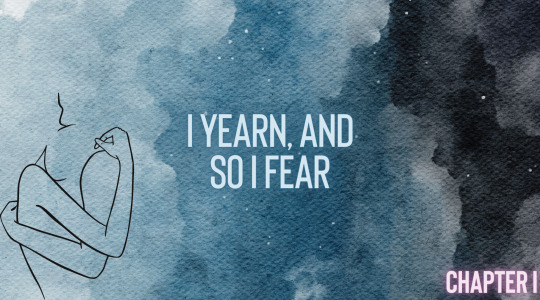
Masterlist | Next Chapter
General Summary. Nearly a year since the Galactic Empire’s rise to power, Kazi Ennari is trying to survive. But her routine is interrupted—and life upended—when she’s forced to cohabitate with former Imperial soldiers. Clone soldiers.
Pairing. Commander Wolffe x female!OC
General Warnings. Canon-typical violence and assault, familial struggles, terminal disease, bigotry, explicit sexual content, death. This story deals with heavy content. If you’re easily triggered, please do not read. For a more comprehensive list of tags, click here.
Fic Rating. E (explicit)/18+/Minors DNI.
Chapter Word Count. 4.8K
Beta. @starstofillmydream

“The risk of love is loss and the price of loss is grief. But the pain of grief is only a shadow when compared with the pain of never risking love.” - Hilary Stanton Zunin
16 Telona
Kazi would never again visit the lighthouse with her sister.
The place where they peeled citrus-stars, watched oceanic storms, danced in puddles, played and laughed, and smacked the other when they argued. It was their sanctuary. And, of course, the ragged lighthouse overlooking Outlook Harbor preserved their culture—the eldest of Ceaian legend.
The legend of the dragons.
As legend claimed, a dragon guarded each Ceaian harbor, its fire a source of light for ships navigating the rugged surf and rocky cliffs. Without the dragons’ guidance, sailors would crash and drown, and the Ceaian population waste away.
When the last of the dragons died, lighthouses replaced their source of light and guidance. But a lighthouse could never replace the security and warmth of a dragon.
A lighthouse could never replace the visceral reaction of seeing a dragon. Of knowing you were home.
Dominated by childlike wonder, Kazi decided, when she was six, that she would buy the old lighthouse and fix it up. Beside it, she would build an inn. And one day her inn—adorned with her sister’s flowers and succulents—would be the most lauded across all of Ceaia.
For years the dream sustained her and her sister. She would run the inn and manage the finances, meanwhile her sister would oversee decorations and meal planning. Nothing else mattered. Except for a rowdy sailor here or there. But Kazi would handle them too. Because she would protect her sister. She would always protect her little sister.
And so those girls dreamt of their future and planned for endless happiness.
But life never cared much for dreams.
Nowadays, Kazi tried to forget the lighthouse’s existence. It made it easier to ignore the ache in her heart and guilt in her mind.
Slashing rain warmed her fingers as Kazi snapped the final window shut, securing the house from the onslaught of the torrential rainstorm. The sunroom’s windows—spanning the entirety of the wall—overlooked the rolling hills of Eluca’s endless jungle, the planet’s three moons hidden behind clouds pregnant with more rain.
Housing a small couch, four armchairs, a game table, and a handful of potted plants Daria fawned over, the sunroom was Kazi’s favorite place in the house. It boasted the best view of sunrises, and the best views of Eluca’s near-daily rainstorms.
Tonight, the storm was the worst Kazi had seen since arriving on Eluca two months ago. It wasn’t an oceanic storm, but it was close enough.
Thunder boomed, loud enough to rattle the windows. Rain harshened its upheaval; lightning spider-webbed chaotic rictuses across the blackened sky.
Kazi started to smile—the awe and terror of raging storms a memory buried—but the muscle movement strained. Her half-smile fell away. She wasn’t sure how long it had been since she last smiled. At least two months. Probably the day before the Purge—
“I met a man at the marketplace today.”
Kazi stiffened. From the corner of her eye, her sister approached the windows, hands clasped loosely before her stomach. A healthy distance—a meter—separated their bodies. Daria seemed to maintain the distance instinctively. Kazi both noted and despised it.
There was a time when Daria would sneak into her bed late at night. Usually scared from the storms, her sister sought refuge beneath her bed covers. She hadn’t minded. What else was a big sister for?
Now, the distance was a physical phenomenon. Tangible; representative of the emotional distance built over the last decade. Kazi held the blame and responsibility. But she still craved the missing connection. The muffled laughter in the middle of the night; sneaky grins; warm hugs.
Daria observed the lashing rain with a blasé countenance that belied her usual calculation. “He’s kind but also ambitious, and his financial situation is sound. I want you to meet him—”
“No.” Kazi crossed her arms over her chest. “I’ve told you, repeatedly, that I won’t entertain arranged dates—”
“This one is good,” Daria interrupted, facing her. “Give him a chance—”
“I said no.” Kazi kept her voice quiet and controlled, refusing to yell and risk waking Neyti. “I’m too busy with work and taking care of you—”
Daria recoiled. A flash of lightning emphasized the blush staining her cheeks. Kazi bit her tongue. Her sister was sensitive to any mention of her illness.
“I only ask that you consider meeting him.” Daria straightened, her gentle poise sharpening, like a vibroblade sparking to life. “I’d like to see you married before I die.”
Kazi bit back her annoyed groan, opting for a glare. Currently, she had three goals, and marriage was not one of them.
The first goal was treatment for her sister’s illness. It should have been simple to accomplish, and while she had found a healer specialized in palliative care, Daria’s symptoms were still ubiquitous and worrisome. Even now sweat beaded her sister’s forehead, and her fingers spasmed unintentionally.
The problem laid with ineffective medicine, according to Healer Natasha’s most recent report.
“As I’ve told you,” Kazi said slowly, “I’m not interested in wasting my time on arranged dates—”
“How are you not lonely?”
Kazi scoffed. “Loneliness is not a reason to get married.”
“Maybe not,” Daria said, “but you have no one to rely on. No parents. No friends. No husband.”
A hollow sensation gaped in her chest but Kazi ignored it.
Daria took her silence as permission to continue. “Marriage is a necessity in life. Humans desire companionship—women desire the stability a man can bring to our lives. We’re not meant to be alone.”
Kazi took a few seconds to organize her thoughts and counterarguments. After years with a mother who shared Daria’s sentiment, she was prepared for this specific debate.
“Marriage isn’t something you can force between two people who don’t know one another,” Kazi started, forcibly calm. “Marriage should be based on love. Not desperation or settling out of loneliness. Marriage is about two people who realize they want to share life together. Who feel life is complete when the other is in it.”
Daria snorted. “That’s quite the idealistic notion of romance I wouldn’t expect from you.”
“It’s not idealistic—”
“But it is.” Daria quirked a manicured eyebrow. “Marriage is a pact to maintain the traditions and ideals of two families, and to implement those beliefs in a future generation. It’s more than just love.”
At the condescension in her sister’s tone, Kazi gritted her teeth. She wasn’t an idealist; she preferred realism as her chosen form of analysis. But love wasn’t an idealistic notion for hopeless romantics. She had read the stories and myths. Love was attainable. Maybe not for her, but it still existed. And she refused to settle for a marriage borne out of duty rather than respect and trust and emotional connection.
The argument represented the sisters’ different lines of thinking, and Kazi couldn’t help but wonder: if their father hadn’t died when they were so young and their mother imposed Reformist teachings on an impressionable Daria, would Daria have shared Kazi’s beliefs?
Then again, Daria was the perfect mold she was trained to be: a dutiful wife. And nothing more.
“Think about Neyti,” Daria said. “She’s a child who needs stability in her life—who needs the stability a man can provide.”
Kazi sniffed. “I don’t need a man to provide stability to Neyti’s life. I can provide it.”
“I know you feel responsible for upholding your promise to her mother,” Daria placated, “but you need to think about this situation logically. Neyti needs a family. She needs two parents. She needs emotional support and love.”
“I can be her family.” Kazi frowned at her sister. “I can raise her. I can love her. I can take care of her.”
“Oh, Kazi.” Daria gave her a sympathetic look that itched. “Do you truly believe that?”
“Yes.”
“You have no emotional capacity for a child. You can’t take care of her the way she deserves to be taken care of. Not when you’re alone.”
Kazi resisted the urge to flinch, and instead, shifted her attention to the game table where a bedraggled stuffed dog laid. The toy belonged to a six-year-old girl—a girl shoved into her arms when she was fleeing Ceaia. A child who no longer spoke and remained an enigma she couldn’t figure out. Neyti.
The second goal was to find Neyti suitable, loving parents. Parents who could raise the sweet child in an insecure world fraught with instability and fascism. However, the goal was proving difficult.
Entering a child into a credible adoption center required extensive documentation. Medical records, education certificates, familial-history records. Kazi didn’t even know Neyti’s last name, much less have access to any of the required documents.
Their first week on Eluca, she enrolled Neyti in the local primary school, and she secured baseline medical tests. The medical tests proved useful for Neyti’s therapy. Still, the adoption process was slow and arduous.
Daria wasn’t aware of Neyti’s impending adoption. She believed Kazi was committed to raising Neyti herself. It was a secret Kazi wanted to maintain. Still, Daria’s concern for her lacking competence to care for Neyti hurt.
“I have emotions, Daria.” Her voice was too strained and Kazi grimaced, clearing away the twinge of hurt. “I’m passionate, I feel things, I experience a wide range of emotions. Just because I don’t allow them to dictate my decisions doesn’t mean I’m unfeeling and emotionless.”
“I never said you were.” Daria waved a dismissive hand. “All I’m saying is that your emotional capacity is not sustainable nor durable for a child. You work all day; you work late into the night. You aren’t physically around much for her, and you’re too aloof to provide her the emotional stability she needs. Have you ever considered why she still doesn’t speak?”
“She’s grieving—she lost her mother two months ago,” Kazi said disbelievingly. “She needs space to grieve, and I’m not going to force her to do something she finds solace in.”
“But have you considered the possibility that she doesn’t feel comfortable or safe with you to speak?” Kazi winced at the accusation but her sister wasn’t finished. “Neyti needs emotional support, which you can’t give if you’re not physically present.”
“This conversation is over.” Kazi uncrossed her arms, fisting her hands behind her back to hide their trembling. “I’m not entertaining a marriage for the sake of a false notion of stability.”
“It’s not a false notion,” Daria argued. “You may refuse to acknowledge it in yourself, Kazi, but I see it. I see your struggles, and I know that you need someone—”
“That’s enough.” She turned away from the windows. “You don’t know me. You don’t know anything about my own wants. So don’t you dare try to pretend that you’re interested in securing me a marriage outside of your own personal goal of making me live up to Mama’s teachings.”
“That’s not what I’m trying to do—”
“It is. Just because you failed to get married and have children, doesn’t mean I want that for myself.”
Daria flinched. Disbelief wrinkled her forehead, and for a long moment, she merely stared at Kazi, as if uncertain who stood before her.
“Every woman wants to be married and have children,” Daria finally said, securing her hurt behind a well-practiced mask. “It’s in our nature.”
“You’re delusional.” Kazi ignored Daria’s affronted glare. “Forget Mama’s teachings. They did nothing to help you, and she was wrong about most things.”
“Don’t disrespect the dead.”
“I didn’t respect her when she was alive. What’s the difference now?”
“Maybe Mama was right.” Daria sneered at her. “Your access to emotions died the day Papa did.”
Kazi opened her mouth—what to say, she wasn’t sure—but two loud knocks on the front door interrupted. A signal. It was a reminder of her third and final goal: to survive the rebel network.
Relations with the rebel network were new and difficult to navigate. Kazi was indebted to them. She owed them her life—and Daria and Neyti’s lives—and for that reason, she served the network’s needs. However, the network wasn’t a benevolent entity, and being indebted to its cause rattled Kazi more than she liked to admit.
Typically, she avoided debts. They forced her into a compromising position, allowing someone the opportunity to control her. She preferred self-reliance to kindness, and when she did indebt herself, she always paid it back quickly.
Her father believed it a question of honor and a true demonstration of character. Her mother took a more cynical approach: “To be in someone’s debt is to give them power over you,” she once told Kazi. “Only fools put themselves in such situations.”
Sometimes she wondered how her mother would have responded to the Purge. Would the Ennari matriarch humble her obstinance to secure a means for survival?
Whatever her mother would have decided didn’t matter. Kazi sought the network’s aid, and now she owed them. So far, she had met Eluca’s five rebels, the cohort a tight-knit group. It was one of many belonging to the larger network slowly establishing a presence in the Outer Rim.
Kazi rarely interacted within the cohort, receiving orders from Fehr or Bash, the network’s main contacts, and acted alone. But that morning, she received a comm from Fehr asking her to join an unexpected meeting. The message left her unsettled, and her arrival at the abandoned warehouse used for most meetings heightened her consternation.
Some days, like that morning, she questioned if she was walking into a trap, wary of Imperial stormtroopers posed for her capture. Today, only the five other rebels were present.
“My contact has informed me that three men want to establish a safehouse out of reach of the Empire,” Fehr said. A human woman at least twenty years Kazi’s senior and the owner of one of Hollow Town’s highest employed farms, Fehr preferred brusqueness to political coyness. It was something Kazi appreciated. “Their operations will be separate from ours.”
Carinthia, a data courier for Moff Harpy of Veridian Sector and a skilled identification and chip saboteur, narrowed her eyes in suspicion. “How do you mean?”
“These men will be running rescue-and-relocate missions.” Fehr glanced across the five other members. “They’re former employees of the Empire.”
Kazi pursed her lips, noting the discomfort of those around her. Bash, Head Treasurer of Eluca’s national bank and a well-respected member of the Elucan government, furrowed his brows. Lore and Sparks, married pilots, shared a skeptical look.
“Former employees of the Empire can’t be trusted,” Carinthia argued, her skin eerily pale in the warehouse’s shadows.
“We trust you,” Lore said casually.
Carinthia sneered. “I never worked for the Empire—”
“But your family—”
“Is of no importance.” Carinthia swiped her hand through the air. “How do we know we can trust these men?”
“The more important question is,” Kazi interrupted, irritated by Fehr’s lack of transparency, “who are these men? You say they’re former employees, but where did they work?”
“Former intelligence workers would be nice to have,” Sparks said. Lore nodded her agreement.
Fehr took a deep breath, black eyes settling on Kazi. “These men are former soldiers.”
Kazi tensed, an unwelcome burst of panic clogging the back of her throat. Fehr wouldn’t risk the dangers of—
“They’re clones.”
In the silence that followed Fehr’s declaration, Kazi forced herself not to react. She bit her tongue until it hurt, controlling her features and ordering her panic to calm the fuck down. She could not appear incompetent nor afraid.
But the panic in her chest was as sharp as an electric shock. Simultaneously heart-stopping and heart-quickening.
“Clones are loyal to the Empire,” Bash said diplomatically.
A silky voice imbued with a calm that complimented Fehr’s usual bluntness, Bash was a difficult person to read. With bronze skin and cunning silver eyes, he and Fehr were the sole rebels indigenous to Eluca. His position within the planetary government, as well as his contacts within the rebel network, made him the most important and powerful member of the cohort.
To learn that Bash wasn’t aware of the clones’ arrival intrigued Kazi. Similar to the Empire’s backstabbing politicking, it seemed the rebel network didn’t share all their information with each of its contacts. Kazi tucked away the information.
“We can’t trust them,” Bash continued.
“Be reasonable, Fehr,” Carinthia said, her smile wan. “Clone allegiance is to whichever government is in control.”
Fehr straightened, and though her tone was collected, it was lined with an edge that could cut. “These men have denounced their allegiances—”
“And their allegiances could switch again.” Sparks shook his head. Even the adventurous pilot was hesitant. “If you need an example: look at the Republic.”
Agreement swept through the small group. But Fehr was staunch in her decision.
“The clones are operating a rescue-and-relocate mission. Our paths will rarely cross, and they won’t be working planetside.” Fehr stared them down, her glare unapologetic.
Shortly after, the meeting dissolved. Kazi made to leave but Fehr motioned for her and Carinthia to stay, the latter throwing a perplexed look at Kazi. The moment Bash left, his eyes narrowed in skepticism, Fehr faced the two women.
“There’s more about the clones that I didn’t share with the cohort,” Fehr said. “The clones will be staying planetside.”
To her annoyance, Kazi noticed Carinthia studying her. They were similar in age, and yet their backgrounds were vastly different. Carinthia hailed from a wealthy family that lived in the Inner Rim, and her shrewd personality bordered conniving.
“They need somewhere spacious to make their base. Somewhere far enough away from the city where they can easily hide.” Fehr squared her shoulders and stared Kazi in the eye. “I offered the men the basement.”
Kazi blinked, uncertain if she had heard correctly.
“The basement…” Her voice hitched and she cleared her throat. “You want the clones to stay in the basement. At the house where I’m living.”
Fehr nodded.
Her hands started to tremble and Kazi clenched her jaw. Clenched it so hard she thought it might break.
“The clones are the reason I’m on this damned planet, Fehr.” The strain in her voice was palpable but she didn’t care. Fehr was the sole rebel she considered somewhat benevolent, and this new information was a betrayal she wasn’t prepared for. “Have you forgotten that?”
“I haven’t,” Fehr said calmly. Too calmly. “But these men deserted. They don’t serve the Empire and they need a place to stay. I considered one of the apartments in town but people will be curious and could start talking. The house is an ideal location.”
The house, not your house.
Because the house didn’t belong to Kazi. It belonged to Fehr who had gifted it to her when she first arrived on Eluca, homeless and penniless.
The memory still rankled her. Her pride cringed at her forced reliance on another person. Her chagrin was further heightened by her financial helplessness. Years of frugality, investments, and savings were made obsolete by the rise of the Empire.
“It’s not that awful, Kazi,” Carinthia said. “The house is large. Large enough for you three to survive cohabitation with a few clones.”
Before Kazi could respond, Fehr raised her hand. “I know your history with the clones isn’t ideal. And if you’re uncomfortable—” Carinthia released a derisive scoff that had Kazi tensing. Fehr shot the younger woman a hard look. “If it’s too much, I can look at other locations. But the basement—”
“Is ideal,” Carinthia cut in. “It’s large enough, and it connects to the communications tower. I assume that’s a necessity for them.” Carinthia twirled a crimson curl around a finger, her expression contemplative. “Eluca’s proximity to a well-plotted hyperlane, and the surgent of Imperial military bases across Veridian Sector and the Outer Rim, at large, make this planet the most effective base.”
Fehr nodded, her attention returning to a still-silent Kazi. “It’s your choice.”
Except it wasn’t. Not really. The house wasn’t even in her name—an attempt to protect her sister and Neyti. To prevent Imperial officials looking into their sudden immigration and ambiguous history.
It was an older yet well-maintained home settled in a forgotten neighborhood five kilometers from Hollow’s Town. The neighborhood stood empty except for two other houses located a kilometer away.
Built a century prior in the midst of a planetary civil war, the basement served as a bomb shelter. One of four designated for the neighborhood. Fortified by duracrete and buried deep in Eluca’s soil, the basement housed five bedrooms with ten bunks each, three refreshers equipped with full amenities, and a war room dedicated to military strategy. The war room was still wired to the communication tower in the capital. The only communication tower available for public use in Veridian Sector with consistent and reliable access to the Mid and Inner Rims.
Kazi had visited the basement once. The darkness, and the knowledge that hundreds of tons of dirt could easily bury her, convinced her never to return. It was the ideal location for rescue-and-relocate missions. Which irked her.
“It’s fine.” She clasped her hands behind her back. She was indebted to Fehr, anyway. “We can make it work.”
Three more knocks, rapid and quieter, followed the first two. The completion of the signal. Kazi followed Daria through the kitchen and toward the front door, her body tensed to a point of pain. Anxiety itched her skin, like thousands of ants crawling along her spine and burrowing in her hair.
She opened the door and then retreated a safe distance. Fehr stepped into the small entryway. Behind her, three males followed. Dark gray ponchos hid their upper bodies and hoods cast their faces in shadows.
Kazi schooled her features into insouciance. One of the few benefits of etiquette lessons: she could control her expression. For the most part.
Rain frizzed Fehr’s ebony hair and the older woman patted her braids, nodding at Kazi. She scanned the kitchen behind the two sisters. “Is Neyti—”
“Asleep.” Her tone was curt and she ignored Daria’s disapproving scowl.
The older woman chuckled. “School must have been exhausting if she can sleep in this weather.”
“The thunder was louder back—” Well, it didn’t matter.
Silence ensued, eclipsed by the echoing thunder and the rain from the clones’ ponchos dripping onto the hardwood floor. Ever the dutiful host, Daria stepped forward, her smile practiced kindness and warmth.
The ease in her sister’s friendliness was a point of jealousy for Kazi. Growing up, she yearned to exude the same gentleness Daria effortlessly managed. She never perfected it.
“Welcome,” Daria said. She gestured to Kazi. “We made up three of the beds downstairs and stocked the fridge with extra food.”
It was a lie. Kazi didn’t shop for the food—only Daria—and she didn’t make the beds. She lugged the sheets and pillow cases from the upstairs closet to the basement but she refused to make a bed for a grown adult.
The clone to the left stepped forward and removed his hood. Beneath the dimmed lights in the entryway his skin was dark brown and his eyes even darker. A white scar threaded itself from his temple to his cheek. Black hair was trimmed precisely, long enough to run a hand through. He looked to be a year or two older than Kazi. Possibly twenty-eight.
“That was generous of you,” the clone said. He gestured to the two other clones. “We’re grateful for this.”
A blush darkened Daria’s cheeks and Kazi almost rolled her eyes. Her sister extended her hand and the clone accepted it. “I’m Daria, and this is my sister, Kazi.”
Kazi didn’t step forward; she didn’t offer her hand. She merely nodded. The clone assessed her for a moment, his eyes flitting from her face to Daria’s, probably noting their differences.
Trained for society, Daria carried herself with an easy elegance. Her hair was honeyed and loosely curled. The green of her eyes was darker than the jungle after a rain shower. Hours gardening over the years had softened the curves of her body.
Unlike her sister, years of swimming left Kazi with an athletic and toned build. A body type undesired by high society Ceaian males, as she was told, repeatedly, by her instructors.
And even though she attended the same finishing classes as Daria, she never mastered her sister’s posh demeanor. She was well-mannered and polite, but she spoke with a bluntness considered too judgmental, further heightened by the darkness of her eyes with their slashes of hazel.
“Like a bird of prey,” her instructor for Poise and Deportment once complained to her mother.
Her mother considered her with a critical eye, and Kazi steeled herself. “I would counter: sunlight in a meadow.”
It was one of the rare times her mother complimented her, and it had stuck with her the last seven years. To this day, her eyes remained her favorite feature.
A throat cleared and Fehr glanced at her chrono. “Kazi, Daria, let me introduce you to former commanders Cody, Wolffe, and Fox.”
Kazi’s heart faltered.
Commanders. The clones weren’t just soldiers. They were fucking commanders.
She shot Fehr a baleful glare. The older woman’s gaze was already on her face, and imperceptibly, she dipped her chin, acknowledgement and confirmation of Kazi’s unspoken accusation.
The woman had known all along the clones were former commanders. She had known and had refused to mention it.
If the situation hadn’t affected her life, Kazi would have admired Fehr’s sly play. Instead, she ignored the woman, fisting her hands tightly behind her back to hide their trembling.
The two other clones removed their ponchos. Kazi tried not to stare but the rumors were true. They were identical. Except for a few distinctive traits.
The one on the right—Commander Fox—bore a scar on his chin; his hair was similarly styled to Commander Cody’s. At her perusal, the clone arched a brow. His eyes swept across her face, in both assessment and curiosity.
She moved her gaze to the last one. Commander Wolffe.
He was observing her with a neutrally-controlled countenance. Narrowed eyes. Rigid shoulders. Calculated expression.
Kazi recognized the look in his face—the subtle wariness and hardened reticence. It was the same shrewdness she practiced. One she relied on to determine genuine from disingenuous; trustworthy from unreliable.
Emphasizing the guarded calculation in his gaze was a stark white scar. Like a bolt of lightning, it seared the skin above his right eye and slashed down to his cheek. Whatever had torn his skin must have ruined his eye, for a silver cybernetic sat in his socket.
“I have business to attend to,” Fehr said, drawing Kazi’s attention away from her analysis. The lack of explanation and the urgency in Fehr’s tone warned Kazi the ‘business’ was network-related.
Once the darkness of night swallowed Fehr’s form, Daria showed the clones to the basement. Surreptitiously hidden behind a white bookcase bereft of personable touches other than a dragon figurine and a few succulents Daria had purchased the last few weeks, the staircase to the basement was dimly lit by a buttery-yellow light. The stairs descended into a blackness thicker than the ocean’s surface on a moonless night.
Few words were exchanged. Kazi didn’t bother with false pleasantries, she left it to Daria, and soon the basement door swung back in place. The bookcase rested snugly against the white wall. Even the most observant soldier would overlook the entrance’s location.
“They seem…nice,” Daria said, shifting the pot of a vibrant blue succulent. “You could have been more inviting.”
“Why?” Kazi gave her sister a condescending smile. “Are you wanting to match me with one of them?”
“Kazi.” Daria released an exasperated sigh. “I’m trying to help you prepare—”
“I don’t need your help. And I certainly don’t want it.”
“Fine.” Dabbing at her forehead, Daria sniffed. “I’m sorry for caring.”
Kazi snorted. “Caring? Is that what you call this nagging?”
“I do care.” Daria started to tremble. “I have always cared and—” She cut off, pressing a palm to her temple, her face screwed in pain.
Kazi reached for Daria’s shoulder, her stomach dipping with concern. But her sister backed away. The dismissal silent yet resoundingly loud. Louder than the thunder rattling the old windowpanes. Her hand fell to her side; she tried to ignore the guilt bittering her mouth.
Lifting her chin, Daria smoothed the fabric of her pale purple dress. She looked Kazi over once, disappointment thinning her lips, and then made her way toward the staircase opposite the bookcase. The old stairs creaked beneath her labored pace.
The moment her sister’s door clicked shut, Kazi collapsed on the bottom step, rubbing her temples.
She didn’t want the clones here. Hell, she didn’t want to be here. On this planet. In this fucking house.
It was too much.
Daria’s disease.
Neyti’s adoption.
Spying for the network.
Three clone commanders.
A disappointment. Incompetent. Indebted. Possibly endangered.
She looked out the kitchen windows toward a clearing sky. Eluca’s three moons peeked through the clouds like a child peering through a curtain. The urge to run—to ignore all of her problems, to avoid the responsibility—hit her.
But she couldn’t run. Not this time.

Masterlist | Chapter 2
A/N: Next chapter release – January 11th
Pronunciations:
Kazi Ennari: kah-zee ; uh-nar-ee
Daria: dar-ee-uh
Neyti: nay-tea
Fehr: fare
Eluca: eh-look-ah (emphasis on first syllable)
Ceaia: say-ee-uh (emphasis on second syllable)
37 notes
·
View notes
Text
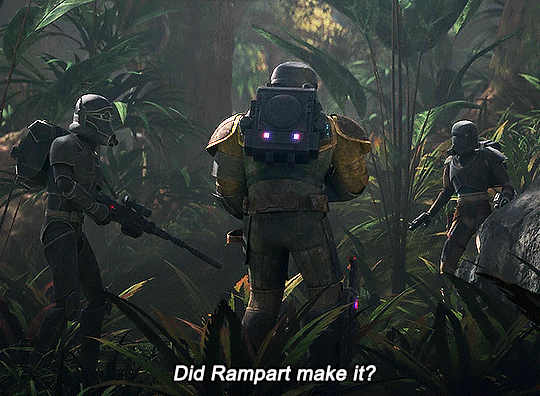
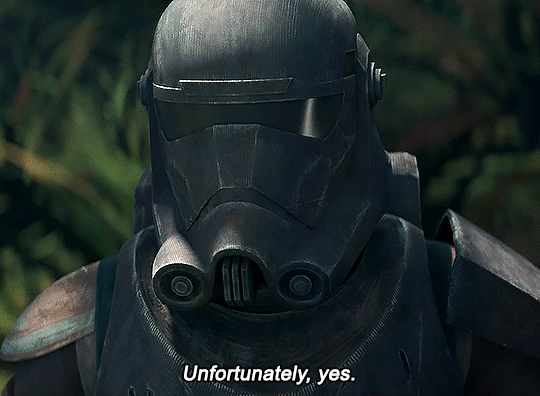
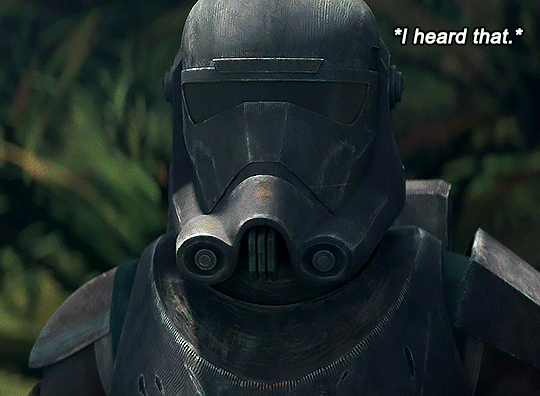
Unfortunately, yes.
#my fav moment of this episode#sassy!Hunter is the BEST#he’s been so sassy the last few episodes and I’m in love with him#tbb spoilers#tbb hunter
2K notes
·
View notes

